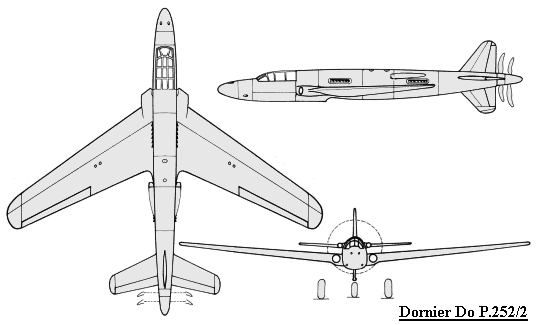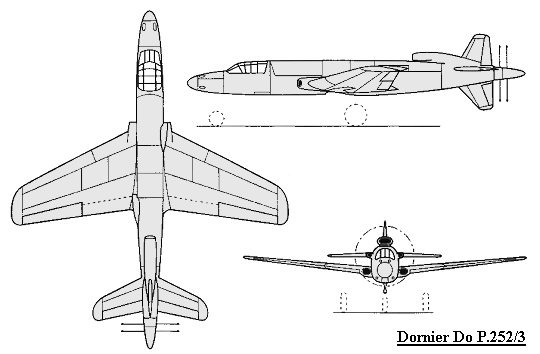|
|
Dornier Do P.252戰鬥機
原文網址:http://www.luft46.com/dornier/dop252.html
原文:
The Dornier Do P.252 was designed in 1943, but was later to be submitted for the optimum Luftwaffe night fighter contract specification from January 27, 1945. Three studies (P.252/1, /2 and /3) were made from this design, all were similar despite their slightly different dimensions and wing plan forms.
The P.252/3 had a lengthy fuselage, with room for a three man crew. The wings were swept back at 22.5 degrees and featured dihedral. There were two Junkers Jumo 213J liquid-cooled 12 cylinder engines (1750 horsepower for takeoff each) with MW 50 boost, which were tandem coupled to an extension shat that drove two 3.2 meter (10' 6") contra-rotating three bladed propellers that featured a blade sweep of 50 degrees. The front engine was fed by round air intakes located in the wing roots and on the starboard side of the fuselage, the rear engine was fed by an air intake located on the port side of the fuselage; there was also a large air intake on top of the rear fuselage just forward of the cruciform tail unit. One advantage of this tail design was that the bottom fin also served as a tail bumper to keep the propellers from hitting the ground on takeoff. The landing gear was of a tricycle configuration, with the main gear retracting inwards into the fuselage and the nose gear retracting to the rear. A three man crew sat in the cockpit located in the forward fuselage, with the pilot and radar operator sitting back-to-back on the left, while the navigator sat facing the front and to the right of the pilot and radar operator. The P.252 had a formidable armament (please see the table below), and there was an internal radar dish inside the interchangeable nose section.
Although there were definite advantages to this design, such as excellent visibility (due to the fact that the engines and propellers were in the rear), heavy armament and good endurance (approximately four hours), the official specification was only for aircraft to be powered by turbojets. So, the Do P.252 design was abandoned reluctantly.
 
翻譯:
Dornier Do P.252設計於1943年,於1945年1月27日被提交出去,最為符合德國空軍夜間戰鬥機合同規定的要求。三項研究 (P.252 /1, /2 and /3)從這個設計開始進行,三個設計皆相似,儘管略有不同的尺寸和機翼的平面形態。
P.252/3有個更長的機身,給三名機組員空間。機翼後掠22.5度,和具特色的上反角。配有兩個容克Jumo213J液冷12缸發動機(每個提供1750馬力起飛)以及MW 50升壓,串聯連接到延伸軸,接著兩個3.2米(10'6“)反向旋轉的三葉螺旋槳,特點是葉片斜50度。前置發動機由附近的位於翼根和機身右舷的進氣口供給空氣,後置發動機由位於機身端口上的進氣口供給空氣;也有一個大進氣口位於機身後部上方,就位於十字尾翼的前方。其中ㄧ個機尾的設計優點是,底部的鰭片也是尾部的保險桿,防止螺旋槳於起飛時打到地面。起落架是三輪車的配置,主起落架往內縮回到機身,前輪則向後縮入。三名機組員的坐艙位於前機身,飛行員和雷達操作員背靠背坐在左側,領航員則向前坐在飛行員和雷達操作員的右側。P.252有一個強大的武器(請參閱下表),以及一個位於可更換的機頭的內部雷達天線。(MK 108 30毫米 機砲 位於機鼻,MK 213C 30毫米 機砲 位於機身下方靠前,MK 108 30毫米 機砲 位於可向上方開火的船尾艙,250 公斤炸彈 攜帶於機翼外部下方,500 公斤炸彈 攜帶於機翼外部下方。)
雖然這個設計有明確的優勢,如良好的能見度(因為引擎和螺旋槳位於後方)、重型裝備和良好的續航力(約4小時),但正式規範是是由渦噴發動機為動力的飛機。所以Do P.252這個設計無奈的放棄了。
007:最近狂翻譯這東西感覺自己英文翻中能力稍稍進步點=_=+
|
|
